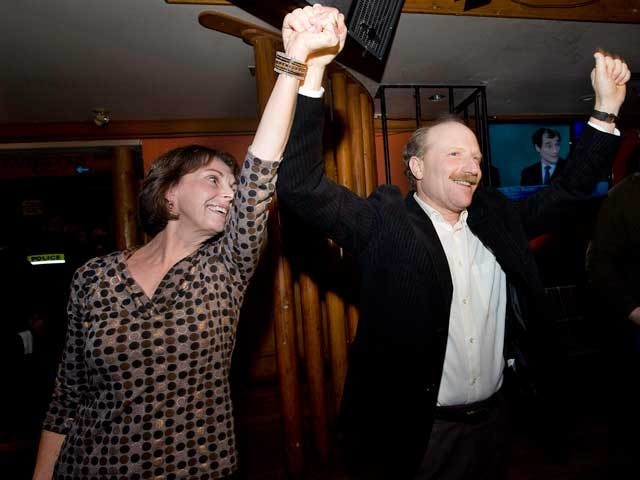The race for mayor of the mountain host of the 2010 Games was a
hard fought one.
But as the final votes were counted incumbent Ken Melamed
pulled ahead of challenger Kristi Wells.
“I am elated and I am relieved,” said Melamed clasping a glass
of champagne and his wife’s hand.
“As usual Whistler doesn’t give me an easy ride and I had to
prove that I wanted it.
“We need to get our fiscal world under control and manage so
that we can put on a fantastic Games. They are our opportunity.
“We have a wonderful community. People are deeply passionate,
as I am, about Whistler and they insist on being part of that and we celebrate
that here so let us continue to increase involvement. We collaborate for
success together and that is what it is about.”
Incumbent councillors Eckhard Zeidler and Ralph Forsyth were
also re-elected. They will be joined by newcomers Tom Thomson, Grant Lamont and
Chris Quinlan, and former councillor Ted Milner. Milner was previously elected
to Whistler councils in 1996 and 1999 before being defeated in 2002.
Councillor Bob Lorriman, the second highest vote getter among
councillors in the 2005 election, was not re-elected.
Even as he celebrated his success Melamed had this to say of
his sparring partner these past few weeks.
“I congratulate Kristi,” he said.
“She has a deep passion and commitment to the community as
well.
“She is s a strong campaigner and I hope she does not pull away
from the community and continues to be an active contributor.”
Melamed garnered 1,527 votes to Wells’s 1,218. Brian Walker was
a distant third in the mayor’s race with 63 votes.
At the root of the win may be a resort-wide feeling that it is
better to stay the course with a known leader as the community comes to terms
with a global recession, the realities of hosting the world’s largest sporting
event — the 2010 Winter Olympics, the constant struggle of finding
employees and housing them, and a tight budget burdened with some large capital
expenditures.
This was Wells’s second try for the mayor’s seat. She ran in
2005, after 12 years as a councillor, finishing third behind Melamed and former
mayor Ted Nebbeling. This year Wells ran on a platform for positive change at a
time when some are wondering how the present council will keep the resort
successful. She was seen by some as sympathetic to development.
Melamed has long been associated with Whistler’s quest for
sustainability and controlled growth.
He was the only councillor who voted against bringing the 2010
Games to town, back in 2002. He wanted to withhold support until the provincial
government, which earns up to $1 million a day in revenue from Whistler, came
through on a promise to share more of the taxes collected from visitors with
Whistler.
Victoria finally granted a new hotel tax deal for Whistler last
year.
For now Melamed, who has lived in Whistler for 32 years, said
his priorities are steering the community through tough economic times, delivering
the best Olympic and Paralympic Games possible, and improving community
engagement.
“Everybody in this global downturn has economic concerns,” said
Melamed, who still ski patrols each winter.
“Whistler has some particular additional concerns over and
above the general decline in tourism: how does a small community like Whistler
host the world in 2010, how do we close the gap in loss of revenues and we are
in the extremely unique position of having to manage municipal infrastructure
and services without growth.”
Despite local accommodation woes grabbing headlines recently
Melamed said the hundreds of new units the town is building in the Olympic
Athletes’ Village and other developments will go a long way to solving the
problem.
And a plan to build temporary housing this winter, the Phoenix
Project, has risen from the ashes thanks to a Vancouver developer. Some prefab
apartment-style homes may be ready by the end of December.




